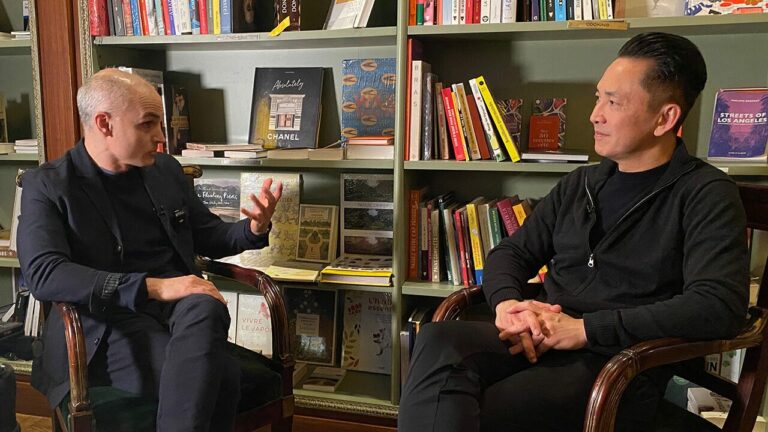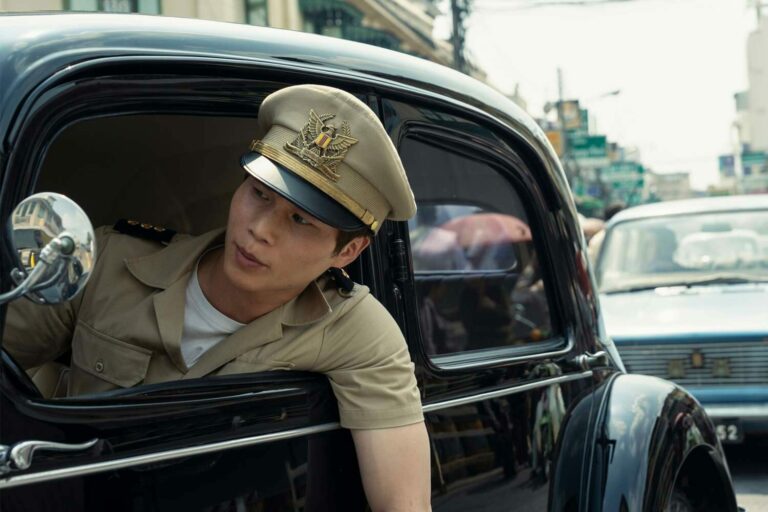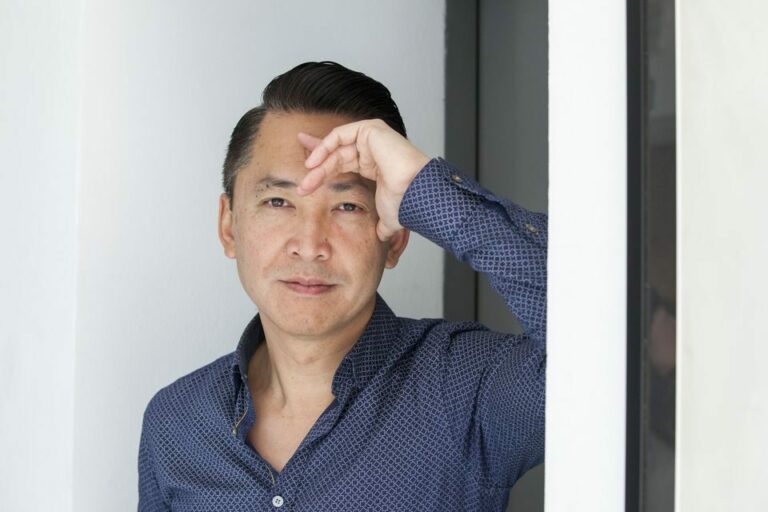Pulitzer Prize-winning author Viet Thanh Nguyen sits down with Seth Meyers to talk about his refugee experience. In part 2 of this interview, he explains the difference between refugees and immigrants and the fears Americans have of them.
Part 1:
Part 2:
Here’s the transcript of the interview:
Seth Meyers: I am such a fan of your work. I loved “The Sympathizers” so much, and then it wins the Pulitzer Prize. I have to ask this. This is a book obviously that will become more popular after the Pulitzer Prize. Do you ever see people reading it? Are you ever in public, and you see someone holding your book? And what’s that like?
Viet Nguyen: I’m in L.A. I don’t think people read books in L.A.
Seth Meyers: Oh yeah, sure.
Viet Nguyen: Yeah. That’s part of the problem. People tell me that they see them in the New York subway.
Seth Meyers: Yeah.
Viet Nguyen: That’s a thrill.
Seth Meyers: The New York subway, it’s true, that is still … There’s less and less. It’s a little sad because, of course, with Kindles now, you can tell less what people are reading.
Viet Nguyen: Right, yeah.
Seth Meyers: But I guess if you’re reading a Pulitzer Prize-winning novel, you want to have it in your lap, let everybody know how cool you are.
Viet Nguyen: Yeah, well show off, right?
Seth Meyers: Yeah.
Viet Nguyen: But the other thing that happened is “The Refugees” is in Costco now, and I’m totally stunned by that. People have been sending me pictures. I know I’ve made it when I made it to Costco.
Seth Meyers: Yeah.
Viet Nguyen: Yeah.
Seth Meyers: I actually was at Costco. I bought 100 “Refugees,” a hundred copies.
Viet Nguyen: That could be a literal statement as a matter of fact. [crosstalk 00:00:47]. There are just refugees hanging around outside, and quite a few, quite a few.
Seth Meyers: So, you obviously or not obviously, but for people who don’t know, you were a refugee. Tell us a little bit about your story and coming from South Vietnam.
Viet Nguyen: Yeah. Well, I was four years old in 1975 when Saigon fell, and we came as refugees to the United States, settled in Harrisburg, Pennsylvania, at Fort Indiantown Gap because refugees had to go through these resettlement centers.
Viet Nguyen: At four years old, I didn’t know what was going on. This is when my memory really begins. My first memory is being taken away from my parents because, in order to leave a refugee camp, you had to have a sponsor, so this very nice white family took me in. But at four years old, all I knew was that I was being taken away from my parents. I remember crying and howling because of that, and I’ve never forgotten that experience.
Seth Meyers: And then you have an older brother, your parents, and you guys then were reunited.
Viet Nguyen: Yeah.
Seth Meyers: And you moved out to California. Is it true that you lied to your parents about what it was that you wanted to be when you grew up?
Viet Nguyen: Well, I was an English major when I went to college, and you know how it is, trying to convince people that you can make a living as an English major is really, really hard, much less telling it to your immigrant parents.
Seth Meyers: Yeah, so it is harder to tell your immigrant parents?
Viet Nguyen: I believe it is harder.
Seth Meyers: Yeah.
Viet Nguyen: When your parents are working 12 to 14 hours a day, and you say, “You know what, I’m going to study the Romantic poets in college.” I said, “Okay, I’m going to study the Romantic poets, but I’m going to be a lawyer.” And that sort of held them off for about four years until I graduated, and I thought, “Well, you know what, I’m going to do a PhD in English,” which didn’t make them that much happier.
Seth Meyers: Did you mumble “English”? “I’m going to get a PhD … in English.”
Viet Nguyen: Yeah. They heard “doctorate,” so I think that confused them for a little bit.
Seth Meyers: That’s good.
Viet Nguyen: Doctorate? Okay.
Seth Meyers: Now, tell me this: does the Pulitzer make up for it? Do they at least understand and have an appreciation for that?
Viet Nguyen: You know, all I had to do to make my dad happy was to win the Pulitzer. There’s a very low bar.
Seth Meyers: See, it’s not hard.
Viet Nguyen: Yeah, yeah. It’s a really good clear trajectory [crosstalk 00:02:35].
Seth Meyers: It’s not hard for immigrant kids to please their parents.
Viet Nguyen: But you know what, model minorities, Asian-Americans, that’s what we’re supposed to do. We’re supposed to win the Pulitzer Prize.
Seth Meyers: Exactly. I’m sure they went around the neighborhood and bragged it up.
Viet Nguyen: You know, what happened was that, when I won the Pulitzer Prize, I was traveling on the road, and I didn’t even call my parents because I think, at the back of my mind, I went back to my childhood. You’re not supposed to go home and tell your parents you get A’s. You only go home and tell them you get B’s, so they can get upset at you.
Seth Meyers: Right.
Viet Nguyen: So, I thought, “Pulitzer Prize, big deal. I’m supposed to get this thing.”
Seth Meyers: Obviously, this is a book about refugees, you wrote a piece in the New York Times talking about the difference between immigrants and refugees and how it … and certainly now, they can get mixed up a little bit. Help us out, give us your definition of why the refugee story is a harder story.
Viet Nguyen: Well, in the United States, we believe in immigration, even though we go back and forth. Sometimes we open our doors, sometimes we close our doors. Right now, we’re closing our doors on immigration. But immigrants are a part of the American Dream and the American mythology.
Viet Nguyen: It’s easy to make sense out of people like me by saying, “I’m an immigrant;” so I have to say constantly, “No, I’m a refugee.” The reason why I have to say that is because I think many Americans think it’s un-American to be a refugee, because the American Dream doesn’t allow for something like that to happen. People like us who are refugees have to constantly remind people of who we are, so that we can humanize who these refugees happen to be. They’re unwanted where they come from, they’re unwanted when they arrive, but we have a great tradition of welcoming refugees and turning them into Pulitzer Prize winners.
Seth Meyers: There you go. I agree.
Seth Meyers: I think memories, and it’s hard for people to remember how things were, but I think Vietnamese Americans, who are obviously now celebrated as this incredibly important part of the American fabric, but you obviously remember a time in 1975 where there were the same kind of fears about Vietnamese refugees as we’re having today about refugees from other parts of the world such as Syria.
Viet Nguyen: Yeah. In 1975, the majority of Americans did not want to welcome Vietnamese refugees, and when my parents opened a grocery store in San Jose, about 1978, I remember going there and not too far away in another store window somebody had put up a sign that said: “Another American driven out of business by the Vietnamese.”
Viet Nguyen: I think that these fears that we have about refugees and immigrants taking our jobs and so on, these are deep-seated fears in the American psyche. Yet, we have time and again proven … immigrants and refugees have proven that when given the chance, we contribute to this country, but the fears keep coming back.
Seth Meyers: That piece was written before the election, if I’m correct?
Viet Nguyen: Yeah.
Seth Meyers: Now, afterwards, we do have a travel ban veto, it was struck down today, but this is what he promised, this is what the president promised. How are you feeling about it now? Now that it’s real?
Viet Nguyen: I feel that this is really also part of America as well. We welcome people in, but we also have a long history of keeping people out with the Chinese Exclusion Act and so on. I think that it is disheartening, it is discouraging that we have this resurgence of xenophobia, but we should look back on our history and realize that the times have been tough before. We fought back. We’ve had a progressive movement. We’ve made the case that immigrants and refugees should be welcome here and should belong here. We’re going to have to make that case again.
Seth Meyers: Well, thank you so much for saying that, and thank you so much for your writing and making the time for being here today.
Viet Nguyen: Thanks for having me.
Seth Meyers: I’m a real fan. Thank you so much.
Viet Nguyen: Thanks, Seth.
Seth Meyers: Viet Nguyen, everybody. The Refugees is available in bookstores now.


